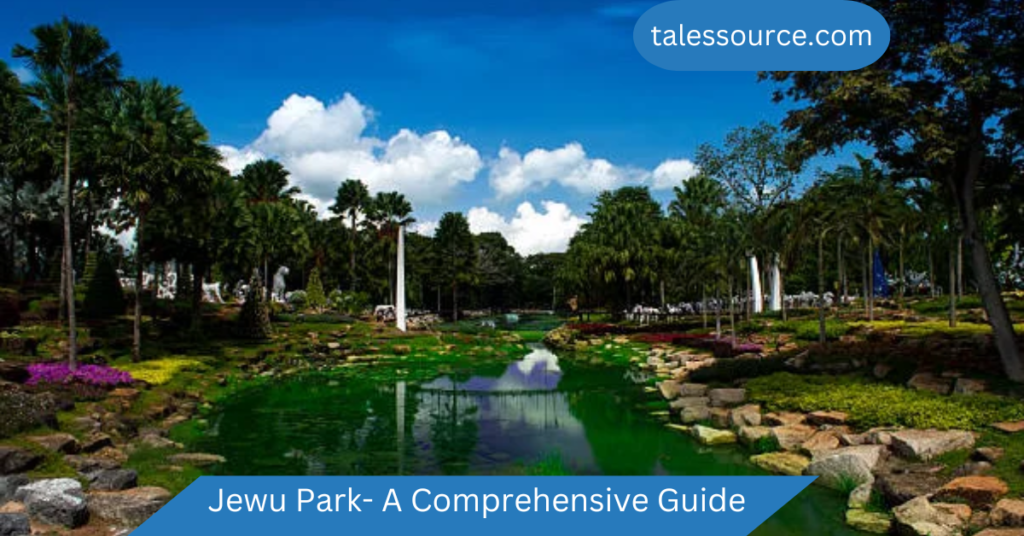Jewu Park- A Comprehensive Guide

Jewu Park is more than just a destination; it’s an experience that merges nature, history, and adventure. Located in a region where lush landscapes meet historical treasures, Jewu Park has become a beloved haven for travelers seeking both serenity and excitement. This article delves deep into what makes Jewu Park a unique and must-visit destination, providing not just information but insightful interpretations and practical guidance to ensure your visit is unforgettable.
Introduction to Jewu Park
Jewu Park is a captivating natural reserve that offers visitors an unparalleled experience of nature’s beauty, cultural richness, and historical significance. Whether you’re an avid hiker, a history enthusiast, or someone looking to escape the hustle and bustle of daily life, Jewu Park has something special to offer. In this guide, we will explore the park’s attractions, its historical background, and everything you need to know to plan your visit effectively.
The Natural Beauty of Jewu Park
A Scenic Haven
Jewu Park is renowned for its breath-taking landscapes. The park is a sprawling expanse of lush greenery, towering trees, and serene water bodies. Visitors can immerse themselves in the tranquillity of the surroundings, with the sound of rustling leaves and chirping birds creating a peaceful ambiance. The park’s diverse flora and fauna make it a perfect spot for nature lovers and photographers alike.
Flora and Fauna
Jewu Park is home to a wide variety of plant and animal species. The park’s ecosystem is carefully preserved, allowing visitors to witness rare plants and animals in their natural habitat. From vibrant wildflowers to ancient trees, the park’s flora is a feast for the eyes. Wildlife enthusiasts can spot various species of birds, mammals, and even reptiles, making it a haven for biodiversity.
Seasonal Attractions
Each season brings a unique charm to Jewu Park. In spring, the park is adorned with blooming flowers, creating a colourful landscape that is perfect for a leisurely stroll. Summer offers lush greenery and pleasant weather, ideal for outdoor activities. Autumn transforms the park into a canvas of warm hues, while winter blankets the park in snow, turning it into a serene winter wonderland.
Recreational Activities in Jewu Park
Hiking Trails
Jewu Park boasts an extensive network of hiking trails that cater to all levels of hikers. Whether you’re a seasoned trekker or a casual walker, the park offers trails that vary in difficulty and length. The trails wind through dense forests, along serene lakes, and up to panoramic viewpoints, providing stunning vistas at every turn. Some popular trails include the Jewu Peak Trail, offering a challenging ascent with rewarding views, and the Lakeside Loop, perfect for a relaxed walk around the park’s central lake.
Camping and Picnicking
For those looking to immerse themselves in nature, Jewu Park offers several well-equipped camping sites. These sites provide a perfect opportunity to disconnect from the digital world and reconnect with nature. The park also has designated picnic areas where visitors can enjoy a meal amidst the tranquil surroundings. Whether you’re camping under the stars or enjoying a family picnic, Jewu Park provides an ideal setting.
Water Activities
Jewu Park is not just about land-based activities; it also offers a range of water-based recreation. The park’s lakes and rivers are perfect for kayaking, canoeing, and fishing. Visitors can rent equipment on-site and spend a day exploring the park’s waterways. For those who prefer a more relaxed experience, paddleboats are available for a leisurely cruise across the lake.
Historical Significance of Jewu Park
Ancient Ruins and Historical Landmarks
Jewu Park is steeped in history, with several ancient ruins and historical landmarks scattered throughout the park. These sites provide a glimpse into the region’s rich past, from ancient civilizations that once thrived in the area to more recent historical events. The park is home to well-preserved ruins of temples, fortifications, and settlements, each telling a unique story of the people who once inhabited the region.
Cultural Heritage
The cultural heritage of Jewu Park is another aspect that draws visitors. The park plays host to several cultural events and festivals throughout the year, celebrating the traditions and customs of the local communities. These events provide an opportunity to experience the region’s culture first-hand, with traditional music, dance, and crafts on display. Visitors can also explore the park’s cultural heritage center, which offers exhibits and workshops on the area’s history and culture.
Conservation Efforts
Jewu Park is not just a place of recreation but also a site of significant conservation efforts. The park’s management is dedicated to preserving the natural and historical resources of the area. This includes protecting endangered species, restoring historical sites, and maintaining the park’s ecosystem. Visitors to Jewu Park are encouraged to participate in these conservation efforts by adhering to the park’s guidelines and supporting local conservation programs.
Practical Information for Visitors
How to Get to Jewu Park
Jewu Park is accessible by various means of transportation. The park is located a few hours’ drive from major cities, making it a convenient getaway for weekend trips. For those who prefer public transportation, there are regular bus and train services that connect to the park. Additionally, the park offers shuttle services from nearby towns and cities, providing a hassle-free way to reach the park.
Best Times to Visit
While Jewu Park is beautiful year-round, the best time to visit depends on what you want to experience. Spring and fall are considered the best seasons, with mild weather and stunning natural scenery. Summer is ideal for outdoor activities, while winter attracts visitors looking to enjoy snow-covered landscapes. It’s advisable to check the weather forecast and park conditions before planning your visit.
Accommodation Options
Jewu Park offers a range of accommodation options to suit different budgets and preferences. Visitors can choose from camping sites, lodges, and nearby hotels. For a more immersive experience, staying at one of the park’s eco-lodges is a great option. These lodges offer comfortable accommodations with minimal impact on the environment, allowing you to enjoy the park’s beauty while being mindful of conservation efforts.
Park Regulations and Safety Tips
To ensure the preservation of Jewu Park and the safety of its visitors, there are several regulations in place. Visitors are required to stay on designated trails, avoid disturbing wildlife, and adhere to fire safety guidelines. It’s also important to be aware of weather conditions and come prepared with appropriate clothing and supplies. For those planning extended hikes or camping trips, it’s recommended to inform park officials of your plans and carry a map and compass.
Conclusion:
Jewu Park is a destination that offers something for everyone, from its natural beauty and recreational activities to its historical significance and cultural heritage. Whether you’re looking for adventure or tranquility, Jewu Park is a place where you can connect with nature, learn about the past, and create lasting memories. Plan your visit to Jewu Park today and experience the wonders of this captivating destination.
FAQs:
1. What are the top attractions in Jewu Park?
Jewu Park offers a variety of attractions, including scenic hiking trails, ancient ruins, serene lakes, and cultural heritage sites. Popular spots include the Jewu Peak Trail, the central lake, and the historical ruins scattered throughout the park.
2. Is Jewu Park suitable for families?
Yes, Jewu Park is an excellent destination for families. The park offers a range of activities that cater to all ages, including easy hiking trails, picnic areas, and family-friendly events. There are also educational programs and workshops available for children.
3. Can I visit Jewu Park year-round?
Jewu Park is open year-round, but the best time to visit depends on your preferences. Spring and fall offer mild weather and beautiful scenery, while summer is great for outdoor activities. Winter provides a peaceful retreat with snow-covered landscapes.
4. Are there guided tours available at Jewu Park?
Yes, guided tours are available at Jewu Park. These tours are led by knowledgeable guides who provide insights into the park’s natural and historical significance. Tours can be tailored to different interests, such as history, nature, or photography.
5. What should I bring when visiting Jewu Park?
When visiting Jewu Park, it’s important to come prepared. Essentials include comfortable walking shoes, weather-appropriate clothing, a map, a compass, and plenty of water. If you’re planning to camp or hike, additional gear such as tents, sleeping bags, and first aid kits are recommended.
6. Is camping allowed in Jewu Park?
Yes, camping is allowed in designated areas within Jewu Park. The park offers several well-maintained camping sites with facilities such as restrooms, fire pits, and picnic tables. It’s advisable to book your camping spot in advance, especially during peak seasons.
7. How can I participate in conservation efforts at Jewu Park?
Visitors can participate in conservation efforts at Jewu Park by following park guidelines, such as staying on designated trails and not disturbing wildlife. The park also offers volunteer programs where visitors can assist with activities such as trail maintenance and habitat restoration.
8. Are pets allowed in Jewu Park?
Pets are allowed in certain areas of Jewu Park, but they must be kept on a leash at all times. It’s important to follow the park’s pet regulations to ensure the safety of wildlife and other visitors. Some trails and areas may be off-limits to pets, so it’s advisable to check with park officials beforehand.
9. What cultural events take place at Jewu Park?
Jewu Park hosts several cultural events throughout the year, celebrating the traditions and heritage of the local communities. These events often include traditional music, dance, and crafts, providing visitors with a unique cultural experience. The park’s cultural heritage center also offers exhibitions and workshops.
10. How can I get to Jewu Park from the nearest city?
Jewu Park is accessible by car, bus, and train from nearby cities. The park is a few hours’ drive from major urban centers, and there are regular public transportation services available. For added convenience, the park offers shuttle services from nearby towns and cities, making it easy to reach the park without a car.





